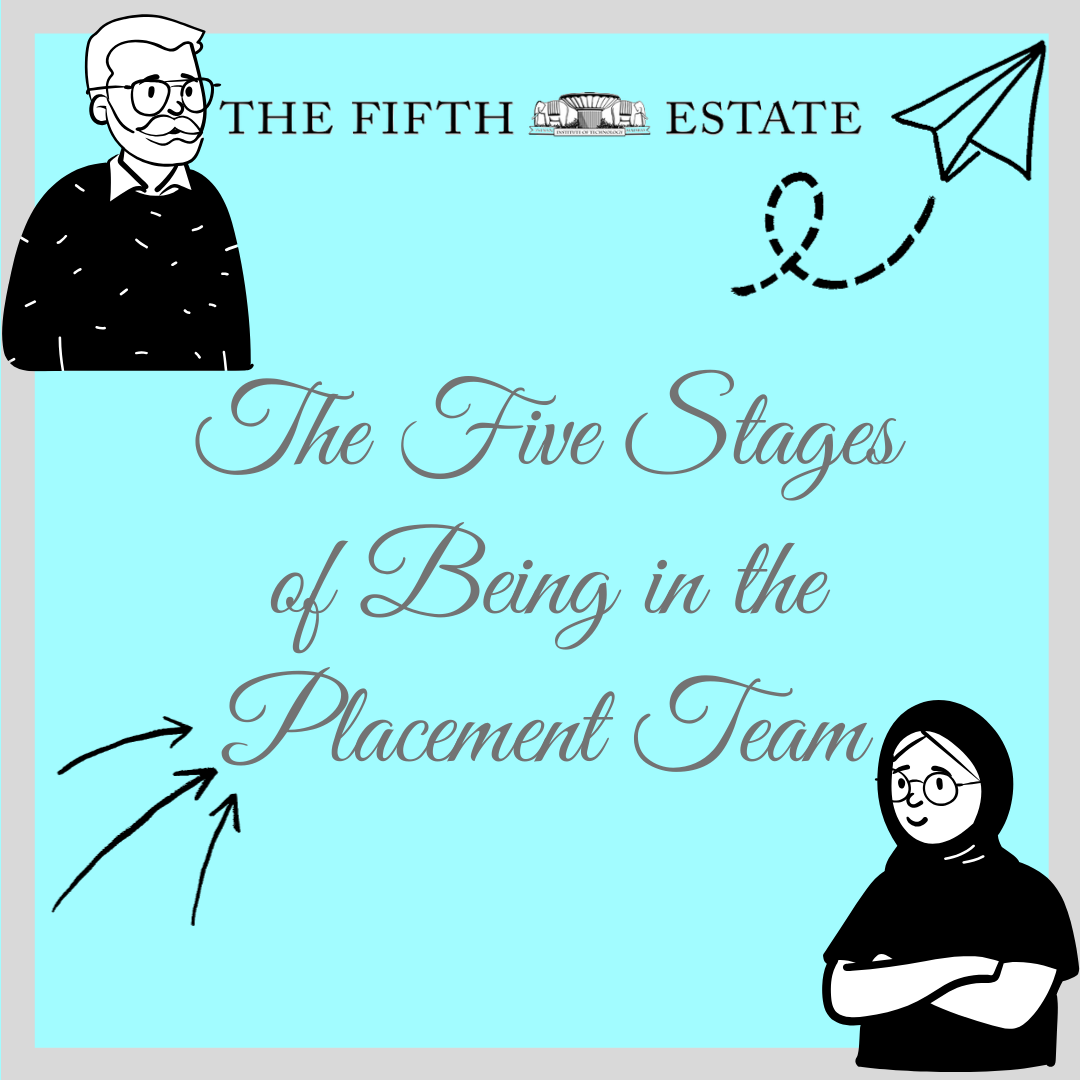Disclaimer: The references and anecdotes mentioned in the article are partly based on official confirmations, hearsay and testimonials. Readers are encouraged to proceed with discretion.
What does it mean to be a god on campus?
Is he the creator and source of all moral authority?
Not even close, let’s try again.
Is he a superhuman being worshipped as having power over human fortunes?
We are getting closer.
Can he then be a political consultant, the likes of Prashant Kishore, weaving narratives and analyzing demographic data? Or is he like the local goons and land-lords who use force to get people to do their bidding? Or is he the loving neta himself, leader of endearing communities, fighting to make their voices heard?
This article delves into the nature of backend electoral politics on campus and the all-encompassing gods that orchestrate the circus. The correspondent physically holds back gags every time they refer to them as gods.
An average year in the life of a backend god begins with deciding who the candidate is going to be. This is not a split second decision as it sounds; it is often the culmination of years of grooming. Every year, the backend is presented with a pool of enthusiastic freshers who are promptly advised to join certain student teams based on their skills, or lack thereof. Among those who eventually rise to core positions, or make the occasional pitstop of hostel and department secretaries, there is consensus-building on who contests for the coveted Institute posts. The numerical majority and ill-gotten reputation is often enough to deter candidates from outside these groups from even contesting. On the off-chance that someone does, they are threatened, intimidated or striken a deal with.
Deal? Sounds like fun. But how do gods deal with each other?
In the corporate world, we often hear the term ‘Single Point of Contact’ (SPOC). These gods can be seen as the SPOCs of their regional groups, with nodes strategically positioned at every intersection. These nodes, further categorized by department and batch, wield considerable power over ten to twenty individuals each.
What does it mean to have power?
It means that these nodes can get people to vote for their candidate, but it rarely ever stops at just that. They can do things as non-coercive as forwarding posters of the candidate in multiple groups. It may mean gathering crowds at soapboxes, hostel campaigns or in a few cases, to physically overwhelm another candidate. Being in the hockey team or the admin of a lowly confessions page is a huge plus in this regard. The god essentially oversees this decentralized network and brokers deals when necessary.
But if linguistic politics dictates that voters of a particular region will support a candidate from their region, what deals are even left to be brokered?
Three points here. Fortunately, there exist several factions within each regional group and there exist a fair share of people who aren’t part of this web of influence. Secondly, the abundance of religious, ethnic and linguistic fault lines creates multiple groups that do not have an obvious choice of candidate and are open to be swayed, appropriately termed as the ‘swing voters’. The tragic irony is that the deciding votes in most closely fought elections belong to those who couldn’t care less about them. Thirdly and most interestingly, since the Institute Elections usually happen simultaneously only once a year, it allows multiple candidates to contest for multiple positions. Not all groups have vested interests in each of these posts. Therefore, the gods orchestrate deals to mobilize votes for each other in positions where they need it most. If group A needs a win in a department legislator position, they may promise their support to a particular hostel secretary candidate from group B, so on and so forth. The most important of these decisions are taken on the day of elections, which also explains why the most involved voters usually vote in the last hour after receiving instructions on whom to vote for in other posts as well.
The currency of these backend dealrooms are not limited to votes alone. It may also involve the allocation of coveted PORs, generally at the core level and above, to their favored candidates. Readers may be well assured that money is definitely involved in this process, whether as direct transfers or as multiple treats that the candidate gives through the process. Undoubtedly, the real benefactors are the owners of Zaitoon, MyBakes and DDiet, whose bread omelets provide the squishy foundation that campus democracy is built on. One needs to pander to the ego of ‘game-changers’, often disguised as annas who were supposed to graduate in 2014 but stay back due to the kick of power they get from this process. Sometimes, the deal may just be of goodwill, best explained by the expression,”I’ll remember your face.” which is to mean that they will assist you through fundaes, placements or any conflict that you may find yourself in the future. The exact nature of this process remains for those in the underbelly of these backends to comment on.
But how exactly is this backend different from the front end counterparts?
The frontend usually consists of those who work on content creation, manifesto ideation and soapbox preparation. Simply put, they are people whom the candidate wants to be associated with in public. They comprise those talented at PR activities or those who are well-respected and well-knowledgeable in their respective spheres. Since most candidates are under the perennial threat of being caught by SEC or the ever-prevalent snitches on any illegal action, they do not openly associate with the backends themselves. Those meetings and deals often happen behind closed doors or through third party intermediaries. Of course, there are those infamous incidents where candidates make threat calls themselves, only to be outed and shamed to everyone’s entertainment. Public apology accepted, at least I accept.
One of the more indirect ways in which these networks operate is through the creation of compelling narratives. Since a large section of the institute will have never directly met or interacted with the candidates, they rely on what other people have to say about them. Their personal lives, habits and past involvements come under significant scrutiny. Personal lives be damned. In recent years, we have seen the onslaught of meme pages sharing screenshots of personal conversations, insinuating jokes or unapologetic character attacks on the candidate or those associated with them. Of course, they shroud under the plausible deniability of butchering candidate names, thus creating the Banchits, Biyas, and Batres of the world. A lot of this information is just blatantly false or an admittedly clever twisting of facts. The Model Code of Conduct exists as a document that candidates read meticulously; only to find the slightest of loopholes and to quote proudly when getting someone else in trouble. Suspiciously staged slogans, planted audience questions and stampedes at soapboxes are not uncommon in this world. Images of candidates engaging in substance abuse have been circulated to bring down their nomination. Candidates have been accused of being sexual harassers just one day before elections to instil fear and solidarity among women voters. And good golly, did this work.
But if the backends are shady, morally-questionable and make people disapprove of them at the surface, why do they continue to thrive with unparalleled power on campus?
One must begin with the larger insti culture of fundaes and references which make it near impossible for a student to accomplish anything of value without the support of seniors. These groups do not emerge out of vacuum during elections. They are cultivated year after year, with some groups even being actively fostered by generations of alumni, who often provide surprising cameos during election season. But similar to most pressure groups, it is unfair to characterize them as entirely malevolent. The way leadership is divided across the institute is already deeply sectarian. Some teams and positions are reserved for certain groups and they hold onto it with a lot of pride. It becomes their way of asserting cultural presence, having a voice in student leadership and cultivating a community for their members to not feel alienated in a campus where solidarity is scarce. Note that this is a campus where most students struggle with English communication, or access to student opportunities or to network with people from backgrounds and identities not similar to theirs. A lot of these regional groups initially originate as a taste of home in an environment where one is separated from the family, friends and communities they grew up with. The creation of regional groups, like any other community, is not malicious by itself; it is a basic human survival instinct. The distaste begins when they use this solidarity as a call for power, cultural dominance, and go to unimaginable lengths to pit themselves against one another. From then, it becomes impossible to stop each group from viewing its losses and setbacks as emotional and political fuel to go to even further lengths to seek redemption.
Back to basics. What is the point of this article? Is it an expose of the system and the beginning of the end of their reign? Haha, I wish. Am I poisoning the minds of young freshers who probably have no idea about any of this? Is this to disillusion them from the oxymoron of campus democracy and show them the futility of the process? Slightly.
At worst, this is a long rant. At best, this is a warning sign to the backends that people are watching and they are not happy. We are sorry if someone convinced you that parochialism, propaganda, violence, and exploitation are skills or badges of honor, leave alone divine powers that make you god. We are sorry that you shroud under the pretext of “This is what it takes” and “This is what it is like in the outside world” as an excuse for poisoning the minds of young adults. One day, and hopefully soon, people will break out of this cycle. The point of this article is for those people to feel assured that there exist sensible and sensitive voters as do candidates who want to create actionable impact. There are people who catalyze their networks to create a change, the same way there are those who use it to swing hockey bats. This is not the only way to win elections; this cannot and need not be so. Only if you, as a voter, move beyond threat, intimidation or the approval of some ill-begotten senior who promises to remember your face. Slowly but surely, this can change. And until that day, we call out these bigots for who they are. Not gods. Definitely and certainly, not gods.




